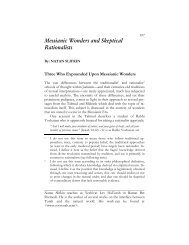Is There a Disconnect between Torah Learning and ... - Hakirah.org
Is There a Disconnect between Torah Learning and ... - Hakirah.org
Is There a Disconnect between Torah Learning and ... - Hakirah.org
You also want an ePaper? Increase the reach of your titles
YUMPU automatically turns print PDFs into web optimized ePapers that Google loves.
32 : Hạkirah, the Flatbush Journal of Jewish Law <strong>and</strong> Thought<br />
• We tend to emphasize a degree of perfection in our children<br />
that causes them to be afraid of chas ve’shalom admitting any<br />
weakness. This fear leads to many adverse effects in their<br />
emotional <strong>and</strong> psychological health, in their religious<br />
practices, <strong>and</strong> of course in their middos (see Sorotzkin ibid.).<br />
Worst of all, it creates an overly cynical attitude toward life<br />
<strong>and</strong> <strong>Torah</strong>. (Much of this is, of course, driven by shidduch<br />
considerations, but also by other factors.)<br />
Homes <strong>and</strong> schools must actively work against these trends. We<br />
must allow our children healthy growth <strong>and</strong> development.<br />
We must teach our children to respect others <strong>and</strong> to refrain from<br />
disparaging others. Much time <strong>and</strong> effort is spent on teaching our<br />
children the איסורים involved in speaking הרע .לשון Thus we teach<br />
them that there לאוים are 16 involved in every הרע .לשון But that is<br />
not enough. Unless <strong>and</strong> until we teach children to respect other<br />
people’s privacy, <strong>and</strong> unless we teach them that sticking our<br />
proverbial noses into other people’s business is inherently disgusting,<br />
they will not cease to find ”היתרים“ for speaking הרע ,לשון if only for<br />
the most “juicy pieces.”<br />
How We Behave<br />
As the Chazon <strong>Is</strong>h used to say, we must be careful<br />
—that is, our children should not hear us preach <strong>and</strong><br />
then see us fail to perform. Thus, we must carefully model<br />
appropriate behavior.<br />
It will not do for us to admonish our children not to be<br />
aggressive, <strong>and</strong> then have them watch us cut off other cars as we<br />
drive, <strong>and</strong> honk our horns at all hours of the night without any<br />
שלא תהיה שמיעה<br />
גדולה מראי יה<br />
increases knowledge?” Firstly, סופרים refers not to students but to<br />
teachers (see the context of the Gemara in Bava Basra, as well as<br />
explicitly stated by Rashi in "א ), who can experience a<br />
mature level of envy (rather than jealousy), which inspires them to do<br />
קנאה ztz”l, more. Secondly, as I heard from Rebbe Mordechai Gifter<br />
need not refer to jealousy or envy; it may refer to zealousness. In other<br />
words, watching the zealousness of others induces one to apply himself<br />
as well.<br />
קידושין פ "ב ע
















